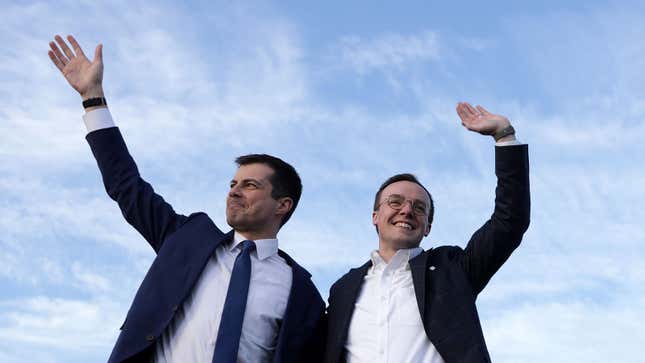Chasten Buttigieg Is Serving Life in the Prison of Other People's Opinions
In Depth
Image: Alex Wong/Getty Images (Getty Images)
A few pages into Chasten Buttigieg’s just-published memoir, I Have Something to Tell You, he conjures an image that justifies his husband Pete’s campaign to become the president of the United States, and, by extension, this book that spends a lot of time focusing on said campaign. It occurs when Chasten and Pete, are strolling down Washington D.C.’s 14th Street during a date night a couple of weeks before Buttigieg announced his bid for president. A woman approaches them from behind and tells them that as a mother of gay children, “What you’re doing for this country and for them… I am just so proud of you and so happy you’re getting out there.” Her “embarrassed, but excited” gay children then introduce themselves. Reflecting on this moment, Chasten writes:
That brief encounter made it clear we had a huge responsibility. We knew we had to get this moment right. Until that evening, I’d never considered that I could make someone’s mother cry just by being myself.
It is nice to make people feel good, and nicer still when you can do so just by showing up. But it would be foolish to assume that “being myself” is a neutral state for a public figure and I Have Something to Tell You is a part conscious, part oblivious chronicle of the painstaking creation of a character. Chasten’s facade is rock solid and though his heart is often detectable in his pages, there is an absence of connective tissue that could have elevated this book from an extremely intricate press release and brand extension for a political family that isn’t going away any time soon. At times, I Have Something to Tell You functions as an assimilationist blueprint that maps the conservative underpinnings and ephemera of a supposedly radical public gesture—a major presidential campaign by an out candidate.
The problem with adopting a feel-good tone is that when apparently unresolved issues surface, they key-clash in cacophony. I had to question if Chasten is actually even ready to be telling his own story.
Chasten, 31, writes of his early childhood in Traverse City, Michigan (he’s technically from the less affluent Chums Corner, he reveals), or “real America” as some might call it. “I was a farmer/actor/nerd you might have recognized from the Christmas-tree farm or the recycling commercial, who could often be spotted wearing Hawaiian shirts while driving his fifteen-year-old minivan to his job as a busboy at the Mexican restaurant,” he writes of his teenage years. Chasten says that throughout his childhood and adolescence, “I was driven by a desire to be out in front.” Because he didn’t fit in and was mocked for his perceived queerness, you could read his desire to stand out as either a leaning into difference or a bid for acceptance. Perhaps it was both—there’s not a ton of introspection there.
Chasten hasn’t quite sorted out his sensibilities. His tone veers from an aw-shucks humility for where he’s happened to find himself (“I never imagined growing up to become a person worthy of writing a memoir”) to a self-seriousness about his responsibility as a gay role model: He recalls introducing Pete for his concession speech and hearing a man cry out, “You saved lives!,” to which he replies, “Yes, we did, together. We did.” When he discusses his social media popularity, he revels in an influencer status (“In 2019, almost overnight, I went from being a middle-school teacher from Traverse City, Michigan, to becoming a person strangers looked to for guidance, reassurance, and the perfect reaction GIF on Twitter”)…but not too heartily: “As the husband of a former mayor and presidential candidate, I realize that I’m the sort of public figure who, in Hollywood, might be described as D-list, if I made it onto any list at all.” His image is aware but unassuming, confident but not entitled. He is the picture of someone who would never have calculated to ascend to his prime-gay status, but is savvy enough to accept the opportunity that has come to him. It reads like humility cultivated in a Petri dish.
It reads like humility cultivated in a petri
There’s a great sense of missed opportunity in Chasten’s failure to connect his inner turmoil of wanting to fit in as a kid with his current mandate to be the anodyne, but relatable spouse of a high-profile politician. He writes of how his brothers would tease his multiple outfit changes in the morning before school that he put himself through in an attempt to will himself into looking “normal.” “I was so obsessed with how people would react to me that I incorporated the horrible things I suspected they thought of me into my self-image, regardless of whether they actually expressed them,” he writes, at another point, of how he manifested internalized homophobia. “I never stopped to consider what I believed, what I thought, and it prevented me from making good choices for myself in many areas of my life.”
-

-

-

-

-

-

-

-

-

-

-

-

-

-

-

-

-

-

-

-

-

-

-

-

-

-

-

-

-

-

-

-

-

-

-

-

-

-

-

-








































